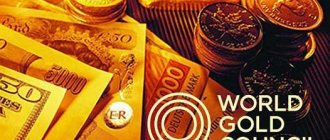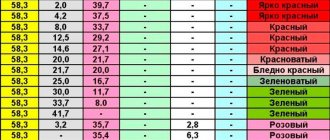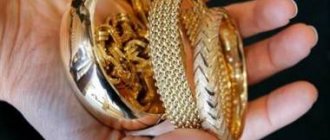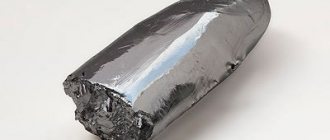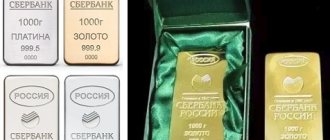Hi all! The abolition of the gold tax in Russia became a real boom. This topic is discussed more hotly than any other.
Indeed, today in all developed countries there is an increase in demand for gold. Two facts serve as excellent confirmation. In most countries there is:
- increase in gold and foreign exchange reserves;
- increasing the volume and rate of gold mining.
Due to the fact that not long ago the President of the Russian Federation signed a law that exempts individuals from 20% value added tax, an increase in demand for gold can also be observed in the Russian Federation.
Russians' interest in bullion is growing, sending them to the dollar and investing in it for a long time.
In signed by Putin V.V. The law deals with banking operations with precious metals.
Simply put, all operations to attract precious metals into individual deposits are exempt from that same 20% VAT. and legal entities. This refers specifically to gold bars.
Possible taxes on gold
There are 2 types of taxes when carrying out transactions with gold and its derivatives.
- Purchase tax (VAT) - rate 20%.
- Sales tax (NDFL) - rate 13%
VAT on gold purchases
What does the state “throw its interest” into in the form of a tax?
- When purchasing gold bars from a bank, value added tax will automatically be included in the price. In fact, you will buy gold at 20% more expensive.
- Purchasing investment coins that are not legal tender. A similar markup in the form of tax.
When selling back to the bank, there is no VAT.
Is it possible to avoid paying VAT?
In the case of purchasing gold bars, if you leave the metal for storage in the bank itself, you will not have to pay VAT. True, there are additional storage costs (cell rental).
This scheme does not work with investment coins (which are not legal tender). You will have to pay on top in any case.
The second option to avoid mandatory VAT is to use alternative methods of investing in gold:
- through compulsory medical insurance (unidentified metal accounts);
- buying gold on the stock exchange (although not all brokers have such a service);
- buying gold ETFs.
Tax on the sale of gold or personal income tax
In what cases does tax arise?
When selling bars, coins, or metal from a brokerage account (not to be confused with an ETF—more on that separately), you are required to pay tax. At a rate of 13%.
Is there any way to reduce personal income tax? Or avoid taxes completely? Can.
Option 1.
If you own gold for more than 3 years, you get a tax break. You will not have to pay personal income tax.
And if the period is less than 3 years
Then we move on to plan B.
It is important to note that all of the listed gold instruments are PROPERTY (Clause 2 of Article 130 of the Civil Code of the Russian Federation). And you can take advantage of the property deduction when selling other property, including gold.
And you have 2 options to reduce your tax.
- When selling, the profit received can be reduced by the amount of expenses incurred. That is, the cost of buying gold.
- Or receive a property deduction of 250 thousand rubles when selling other property (gold). Provided to the taxpayer every year.
Example 1.
An investor bought gold for compulsory medical insurance in the amount of 100,000 rubles. A year later he sells all the gold for 200,000.
What is the best way to pay taxes?
If the amount received from the sale is reduced by the amount of expenses incurred, then the net profit is 100,000. You need to pay tax on it - 13 thousand (at a rate of 13%).
Or you can apply a property deduction. And completely avoid taxation. Since the total income from the sale does not exceed 250 thousand rubles.
In such a situation, it is more profitable to apply a property deduction.
Example 2.
An investor bought gold for compulsory medical insurance for 300,000. A year later it costs 400,000 thousand.
When selling, there will again be a profit of 100 thousand and the tax according to the first scheme (income-expenses) will be 13,000 rubles.
You can apply a property deduction (and exempt from tax) only 250 thousand. The remaining 150 thousand rubles are subject to taxation. 13% of 150 thousand = 19,500.
In this case, it is more profitable for us not to apply the property deduction. And use income tax.
Pros of this investment method
- Minimum costs compared to other tools. Thus, when buying an ETF or mutual fund, an investor must pay for fund management; When buying gold on the exchange, you only pay a commission for a trading operation, which can be hundredths of a percent of the transaction amount, depending on the broker and tariff you choose.
- Opening an impersonal metal account (OMA) or buying bullion in a bank forces the owner to sell it only to the bank where it was purchased, at the rate that will be in the bank at the time of sale, and it is also worth taking into account VAT if the client receives the bullion.
- Futures contracts have a time limit - investors are forced to buy new ones when the old ones expire.
- storage, management or VAT fees when purchasing gold on the exchange.
- Purchasing precious metals is available to unqualified investors.
The minimum volume of gold traded on the exchange is 10 grams, and for silver - 100 grams
There is even the possibility of delivering physical gold to the buyer. In addition to storage costs, upon receipt of the bullion there is a need to pay VAT in the amount of 20% of the cost of the bullion
Important information
Banks and brokers are not tax agents when dealing with gold. Therefore, you will have to file a return, calculate and pay taxes yourself.
If the period of ownership of gold is less than 3 years, filing a declaration is required. Even if there is no tax to pay.
It is imperative to keep all documents. To confirm the date of purchase and the amount of expenses incurred.
For several years now, a bill on the abolition of VAT on the purchase of gold (in bullion) for individuals has been floating around. Until now it remains only on paper. The government has already sent it for revision several times (read “not accepted”).
Taxes
- When trading precious metals, a private investor incurs an income tax (NDFL) of 13%.
- Income received from owning metal for a period of more than three years is subject to property deduction.
- If the precious metal is in a bank account for more than 3 years, the income is exempt from personal income tax.
- The broker does NOT act as a tax agent for the investor in transactions with precious metals, but provides all the necessary documentation for filing a tax return, Form 3-NDFL.
Precious metals are stored in a special brokerage account
in precious metals, which is a separate bank account in precious metals opened by a broker at a bank.
Tickers:
for gold - GLDRUB_TOM, for silver - SLVRUB_TOM.
You can buy metals using an IIS and receive deductions from the IIS, but the 3-year exemption (LDB) does not apply to precious metals.
Investing in gold through ETFs
Unlike the above options for buying gold, gold ETFs are not assets. A refers to securities.
Accordingly, a tax of 13% will be levied only on profits. When selling ETFs.
There are several ways to reduce taxes:
- own an ETF for more than 3 years and receive a benefit (tax exemption) of 3 million for each year of ownership.
- buy ETFs on the second type of IIS, with complete exemption from tax on the sale of securities.
- Use some tax tricks (legal) to reduce the overall tax amount.
A broker is a tax agent. There is no need to file a tax return or pay taxes on ETF transactions yourself.
Golden cut-off: VAT on precious metals is going to be abolished
Investments in gold will not be subject to value added tax (VAT). A bill on this has been submitted to the government, the Ministry of Finance told Izvestia. The department said that the initiative will increase the demand of private investors for the precious metal by 15 times - up to 50 tons per year. It is expected that investments in it will become one of the main ways of accumulation in addition to traditional bank deposits, since gold is protected from dollar inflation. Investing in metal can indeed become an alternative to deposits or bonds, experts interviewed by Izvestia agreed with the Ministry of Finance. However, they noted that this will be relevant only for a narrow segment of the population, since only wealthy Russians will be able to afford the bullion.
One less tax
The government is already considering a bill to abolish VAT on the purchase of gold, the Ministry of Finance told Izvestia. They clarified that the document was developed by members of the Federation Council.

Added value: budget revenues from the increase in VAT will amount to 800 billion
Of this, 460 billion rubles will be paid by the population
VAT is one of the main barriers to the growth of investments in the precious metal, the department is confident. Zeroing the tax will lead to a jump in demand for gold from the current 3-4 to 50 tons per year over the next 3-5 years. The source of the main financial investments can be the savings of the population, which, according to various estimates, amount to about 4 trillion rubles, the Ministry of Finance added.
Now gold bullion does not look as attractive for accumulation as, for example, securities, since it is subject to VAT, explained the President of the National Financial Association Vasily Zablotsky. The price of a precious metal when purchasing it from a bank includes a tax of 20%, while upon sale this amount is not reimbursed. This significantly restrains the demand for investment gold.
The effect of the abolition of the tax will be comprehensive, the Ministry of Finance is confident. In addition to the growing popularity of this asset among investors, revenues to the treasury will have to increase. The profitability of a credit institution when selling precious metals is 5–10%, the department noted. With a minimum interest rate, the banking sector transfers about 26 million rubles per ton of gold sold to the budget as income tax. Thus, with a planned sales volume of ingots of 50 tons per year, the amount of fiscal contributions will be about 1.3 billion rubles. In addition, the amount of mineral extraction tax from the extraction of additional volumes of precious metal will be about 6.2 billion rubles.
The press service of the Federation Council, as well as a representative of one of the authors of the bill, First Deputy Chairman of the Federation Council Committee on Budget and Financial Markets Nikolai Zhuravlev, did not answer Izvestia’s question about the timing of the adoption of the document. The Federal Tax Service did not comment to Izvestia on the consequences of zeroing out VAT on investment gold.
Too tough
Meanwhile, experts interviewed by Izvestia generally have a positive assessment of the abolition of the value added tax on gold. According to them, this will contribute to the emergence of a new profitable investment instrument in addition to traditional bank deposits, bonds and shares. According to Vasily Zablotsky, the experience of China, where VAT on precious metals has been reset to zero, shows that such a solution significantly increases interest from clients. According to the World Gold Council, the demand for gold in our country was 2.8 tons per year at the end of 2018, while in the Middle Kingdom it reached 304.2 tons, noted Vasily Zablotsky. For comparison: in India the figure reached 162 tons, and in Germany - 96. The presence of VAT makes ingots unattractive for investment, agrees RANEPA Associate Professor Sergei Khestanov.
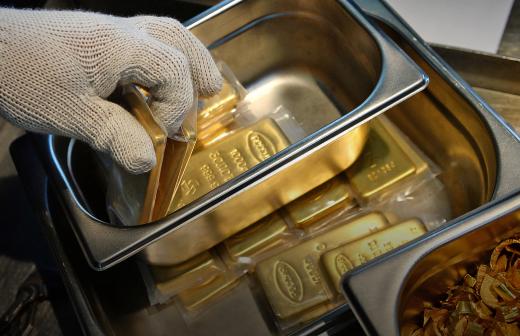
Bullions of the company: gold proposed to be deprived of VAT
In this case, the metal will compete with foreign currency deposits
After the abolition of the value added tax in Russia, there may be an increased demand for metal from legal entities and individuals, not only on the over-the-counter market, but also on the stock exchange, says Vasily Zablotsky. But he noted that this demand will be local.
Sergei Khestanov does not expect a massive stir either. According to him, the investment potential in our country is small: only fairly wealthy people can afford to buy gold bars. According to the Central Bank, now a gram of gold costs about 2.8 thousand rubles. At the same time, financial organizations sell it in volumes from 1 to 13.3 kg.
When buying precious metal, citizens view it as a way to hedge against risks. Gold, as a rule, rises in price when all other assets fall in price, added Sergei Khestanov. Vasily Zablotsky noted that this is a kind of “safe haven”, since investments in this metal are the most conservative instrument, protected from dollar inflation.
The leading financial advisor of BCS Premier, Anton Berliner, shares the same point of view. He believes that gold's popularity as a defensive asset is increasing as the likelihood of a global recession increases. This means that many conservative investors who fear banking and currency risks may find the opportunity to purchase precious metals without VAT attractive, the analyst said.
Thus, as experts note, the initiative fits into the general course of de-dollarization of the economy. Gold can also become a more convenient option for transferring an inheritance or saving money under unfavorable conditions.
To summarize:
- Purchasing gold bars and investment coins is not entirely profitable due to VAT surcharges.
- By law, when carrying out purchase and sale transactions with gold and its derivatives (except ETFs), you must independently declare the financial result.
- With the help of a property deduction, upon sale you can “zero out” the income tax. Up to 250 thousand rubles per year. Regardless of tenure. In this case, impersonal metal accounts have an advantage (but high spreads in banks must be taken into account).
- Benefit for 3 years - provides complete exemption from income tax.
- From the point of view of optimal taxation, it is worth considering either compulsory medical insurance or ETF.
Happy investment with low taxes!
It will be useful!
——————-
Where and how the MoneyPap family invests (successfully) (PDF) . In this document, I honestly tell you what profitable instruments my family invests in. Download the PDF for free - here.
——————-
Excel spreadsheet for ✔ Accounting, ✔ Control and ✔ Monitoring of investment portfolio + Video instructions. I didn’t find anything similar in the free and paid options and created my own table, which I’ve been using for many years . The price for everything is 180 rubles! Find out more here.
Where is the best place to buy gold bullion?
Despite the relatively high commission of Sberbank, we recommend buying gold bars from this bank. Considering that you will have to pay 18% tax anyway, an additional 1-3% commission will not greatly affect the final price. The advantages of this option more than outweigh the excessively high commission. You are more likely to be able to sell a bullion purchased at Sberbank at some other bank. At the same time, a bullion purchased from another bank will be more difficult to sell at Sberbank. It often happens that small banks that sell gold bullion do not buy them back. Thus, the purchase and sale of gold bars at Sberbank is a more liquid option than in other organizations. Considering the huge tax, it only makes sense to buy bullion for the long term, at the end of which it would be nice to be able to sell this bullion. Sberbank is a state-owned bank, as well as Russia's largest bank, and has the best chance of surviving major economic disasters.

